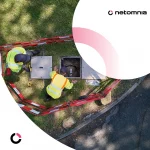Microsoft Backed Researchers Significantly Improve Hollow Core Fibre Cables

A team of Microsoft backed and largely UK based researches, which were originally part of Lumenisity – a spinoff from the Optoelectronics Research Centre (ORC) at the University of Southampton, appear to have succeeded in reducing attenuation and other signal degradation phenomena in next gen hollow core fibre (HCF) broadband cables – boosting speeds by 45%.
Conventional optical fibre cables work by guiding laser light through solid glass cores, which need to be extremely transparent in order to avoid signal loss. But even the clearest of fibres can still suffer a slight loss over distance, although researchers have long been refining a possible alternative for the future.
By comparison, HCF cables have an air-filled central core (i.e. light travels faster through the air than glass), with an outer ring of glass to help guide the beam, which helps to resolve some of the aforementioned issues – improving data speeds and latency. BT trialled one such solution back in 2021 (here), but the technology still had some issues with the signal losing too much power.
Advertisement
Modern solid core fibres typically deliver a minimum loss of 0.14 decibels per kilometre (0.14 dB km-1), but the researchers were able to improve their alternative HCF solution to deliver “unprecedented transmission bandwidth and attenuation, with a measured loss of 0.091 dB km-1“. According to The Register, this marks a big improvement, as past HCF solutions delivered a measured loss of more like 1 dB km-1, and you thus don’t need to amplify the signal as much.
Extract from the Paper (Nature)
A critical component of optical communications is the availability of a suitable waveguide technology for the transport of electromagnetic waves with low loss over a broad spectral range. In the past four decades, despite extensive research, the attenuation and spectral bandwidth of silica-based optical fibres have remained relatively unchanged, with state-of-the-art fibres offering values of 0.14 dB km−1 and 26 THz below 0.2 dB km−1, respectively.
Here we report a microstructured optical waveguide with unprecedented transmission bandwidth and attenuation, with a measured loss of 0.091 dB km−1 at 1,550 nm that remains below 0.2 dB km−1 over a window of 66 THz. Instead of a traditional solid glass core, this innovative optical fibre features a core of air surrounded by a meticulously engineered glass microstructure to guide light. This approach not only reduces attenuation and other signal degradation phenomena, but it also increases transmission speeds by 45%.
Furthermore, the approach theoretically supports further loss reductions and operation at wavelengths where broader bandwidth amplifiers exist, potentially heralding a new era in long-distance communications as well as remote delivery of laser beams.
All of this sounds good, although it’s worth pointing out that HCF cables aren’t going to be used to replace all of today’s optical fibres – at least not for many decades (if ever) – because we aren’t even close to maximising the capability of existing solid core fibres. But HCF cables could be more widely deployed as part of new core network links, or for providing backhaul style capacity over longer distances etc.
Microsoft is a data behemoth, and thus their interest in this field is clear to understand.
Mark is a professional technology writer, IT consultant and computer engineer from Dorset (England), he also founded ISPreview in 1999 and enjoys analysing the latest telecoms and broadband developments. Find me on X (Twitter), Mastodon, Facebook, BlueSky, Threads.net and Linkedin.
« ISP GoFibre Hands Out Funding to Northumberland Community Projects






















































Hollow core fibre does jack all for speed. It does reduce latency but you wouldn’t notice it in the distribution network only in the long haul networks and even then at continental distances.
The paper claims increased bandwidth too, so that would enable faster transmission speeds.
“reducing attenuation and other signal degradation phenomena”
Reducing other signal degradation phenomena suggests it is indeed capable doing faster speeds.
You will decrease dispersion which theoretically would allow faster speeds. However current speeds are no where near the dispersion limit and it is not clear how you can either switch a laser fast enough or a get a photodiode to react fast enough to take advantage of the reduced dispersion.
It is an interesting topic, but I am not sure that HCF would be deployed into a wider network in the medium/long term, other than for very specialised use cases.
This is a technology that may benefit low-latency requirements that are far more stringent than those required by residential and most business operations.
There are also other approaches being researched and tested to enhance the capacity of existing fibre networks that raise the adoption bar for HCF in even interconnects.
Next step: evacuate the core and transmit in vacuo. Even less attenuation and max velocity. But I think that has also been done.